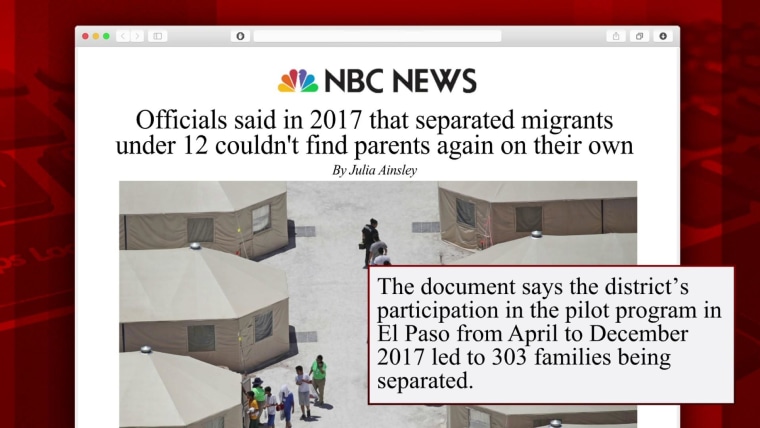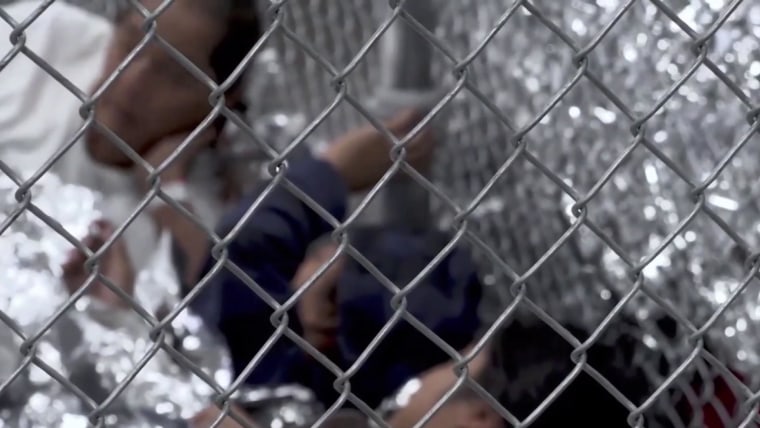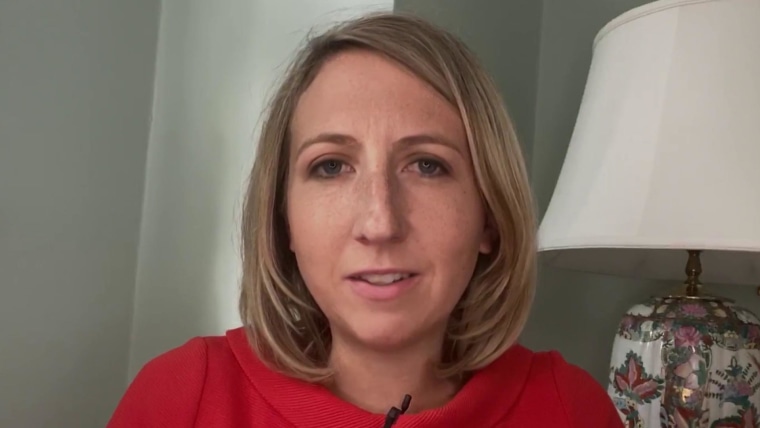WASHINGTON — Federal prosecutors who ran a 2017 “pilot” program for migrant family separation determined that children younger than 12 should not be separated because most could not find their way back to their parents on their own, according to a copy of a Justice Department memo obtained by NBC News.
The pilot program in El Paso, Texas, laid the groundwork for what became the Trump administration’s “zero tolerance policy,” which separated more than 3,000 children from their parents in 2018. But the memo, prepared for John Bash, the U.S. attorney for the Western District of Texas, was never sent to Justice Department officials in Washington, according to a draft report from the department’s inspector general obtained by NBC News. And, the draft report says, Rod Rosenstein, then the deputy attorney general, told federal prosecutors on the southern border in a conference call that no child was so young that a parent should not be separated for prosecution under the zero-tolerance policy.
Rosenstein declined to comment.
The Jan. 7, 2018, memo from El Paso also indicates that neither the pilot program nor the zero-tolerance policy enacted across the southern border later that year was created with a plan to reunite families; instead, it expected that children would see their parents again when both were deported to their home countries.
The inspector general’s draft report says, “We found no evidence that DOJ leadership sought information about the challenges encountered during the Initiative,” referring to the El Paso pilot program, “including the government’s inability to reunify separated families prior to referencing the El Paso Initiative as a basis for expanding referrals of family unit adults throughout the Southwest border.”
The author of the memo, the deputy criminal chief for the Western District of Texas, wrote that there was a concern “that we did not want to separate a child from a parent and not be able to reunite them.”
The document says the district’s participation in the pilot program in El Paso from April to December 2017 led to the separations of 303 families. Those separated included 11 children who under 1 year old, 22 who were 1 year old and 28 who were 2 years old. By mid-August 2017, the memo said, prosecutors realized that some children were too young to be separated and established a litmus test to determine which children were too young.
“The analysis focused on whether the child was mature enough to be separated from the accompanying parent. The agents were to determine whether the child could effectively communicate where they were from, where they lived, their address, where they were going to, who they were to meet,” the memo said.
After the litmus test was imposed in August 2017, very few children under age 12 were separated, said the deputy criminal chief who write the memo.
Bash commissioned the memo after a briefing with Justice Department leaders in Washington on Dec. 27, 2017. The draft says Bash was asked to brief officials about the possibility of developing guidelines that would protect young children from being separated from their parents should the policy be implemented all along the southern border.
Bash had recently assumed the role of U.S. attorney; his predecessor oversaw the pilot program.
The inspector general’s office found no evidence that Bash ever sent the memo to the offices of Rosenstein or Jeff Sessions, who was then the attorney general, and no evidence that they ever asked for it. Asked why he did not send the memo to Washington, Bash told the inspector general that when he was not asked for it, he assumed that the Justice Department either had gotten the information it needed elsewhere or had abandoned the idea of border-wide separations.
Bash told the inspector general’s office that he did not send the memo without such a request because he had “no interest in pushing DHS to restart family unit referrals or in nationalizing the concluded pilot program,” according to the draft report, and that he thought sending the memo would “re-commence the discussion.”
While the zero-tolerance policy was in effect in mid-2018, however, Bash did field a list of questions from U.S. attorneys along the border who were concerned about the number of parents who were being referred to them for prosecution, according to the draft inspector general’s report. He asked why the Department of Health and Human Services did not just return children to their parents as soon as the parents were out of the criminal justice system.
In a email to Justice Department officials on June 18, 2018, Bash asked whether it was true that parents were told that their children were being taken for baths, something he had been told by a public defender.
President Donald Trump extended the zero-tolerance policy in an executive order two days later, on June 20.
Bash announced his resignation this week, citing a desire to go into private practice. He had also been tasked by Attorney General William Barr to investigate Obama administration officials for ordering the “unmasking” of Michael Flynn, Trump’s former national security adviser, in intelligence reports.
Bash and a spokesman for the U.S. attorney’s office declined to comment.
New details of the Justice Department’s role in “zero tolerance” have emerged in the draft of the inspector general’s report, which was first reported by The New York Times.















